The Latest from Kalman J. Kaplan

BIBLICAL PSYCHOTHERAPY
Reclaiming Scriptural Narratives for Positive Psychology and Suicide Prevention
Click here to view a new video overview of this book by authors Kalman J. Kaplan and Paul Cantz on YouTube.
Click here for more about the book.
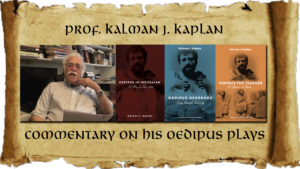
OEDIPUS TRILOGY
AVAILABLE ON YOUTUBE!
Click the links below to view the video of a public reading of each play on YouTube.
Click here to read Professor Kaplan’s commentary on his Oedipus plays.
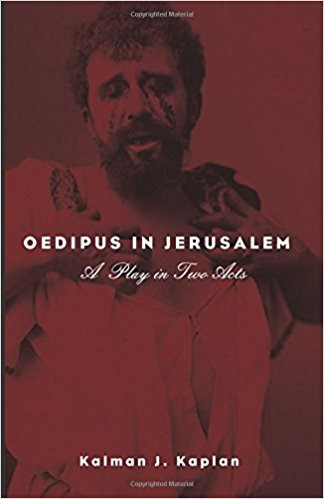
Oedipus in Jerusalem: A Play in Two Acts
Oedipus in Jerusalem begins with the unexpected meeting of the blinded Oedipus and the biblical prophet Nathan outside of Thebes. As the play unfolds, Nathan brings Oedipus to the Great Sanhedrin in Jerusalem for a formal trial with regard to his actions of patricide and his subsequent incest with his mother. The author of this play uses the characters and facts that exist in Oedipus Rex, the Athenian tragedy by the Greek playwright Sophocles, but employs the Sanhedrin to reach a dramatically different conclusion with implications for present times.
Learn more about this play
Watch a public reading of this play
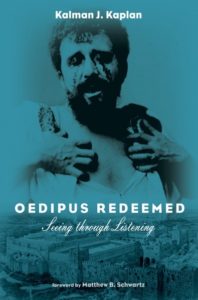
Oedipus Redeemed: Seeing through Listening
“In this play, Kalman Kaplan, masterfully dramatizes how two great traditions that appear irreconcilably opposed can come together and find a resolution. Kaplan achieves this by brilliantly matching similar narratives delivered by analogous figures from the two opposing camps. While the play is set in the Ancient World where the Greek tradition of Fate opposes the Hebrew God, the dramatic dialogues provide a much needed model for conflict resolution in the divided world of today.”
—Thomas H. Jobe, University of Illinois at Chicago
Learn more about this play.
Watch a public reading of this play
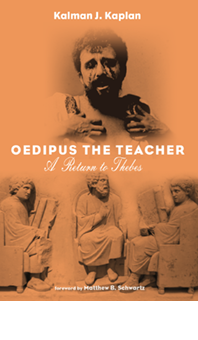
Oedipus the Teacher: A Return to Thebes
In this third play, Oedipus the Teacher, Oedipus returns to Thebes with Ismene to teach the lessons he has learned in Jerusalem with the help of a Greek assistant, Kallias, recruited by Sophocles. Oedipus contrasts the destructive results of Greek riddles with parables emergent in biblical narratives. Kallias falls in love with Ismene and becomes rivalrous toward Oedipus, reflecting a distorted Greek view of relations between fathers (older men) and sons (younger men). Several biblical stories are offered as antidotes. Oedipus comes to live with Ismene and Kallias and becomes a doting grandfather. The play ends with the announcement that Oedipus’ course is to be taught all over Greece. Oedipus states that he is finally happy.
Learn more about this play.
A public reading of this play will be available soon.
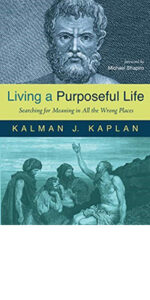
Living a Purposeful Life: Searching for Meaning in All the Wrong Places
While meaning and purpose are often seen as synonymous, this book argues that they sometimes are in opposition, the search for meaning at times suicidal, and living with purpose life-enhancing and invigorating. No people seemed to search for meaning in their lives more than did the ancient Greeks. They were not content with living simple lives but oftentimes took on gargantuan tasks which resulted in a great deal of upheaval and unpleasantness in their everyday lives, and oftentimes to disaster, indeed suicide. The biblical human being, in contrast, is not driven to search for meaning in this way. One’s purpose is inherent in daily life. One does not need to search for it. The God of the Hebrew Bible makes the human being, man and woman, in His own image. He then breathes life into man. Life has an inherent purpose. Man must be a steward of God’s creation.
Learn more about this book
 Parables and Riddles in Ancient and Modern Teaching
Parables and Riddles in Ancient and Modern Teaching
This book is about the difference between parables and riddles, and between different views and definitions of wisdom and attitudes towards the possibility of its attainment. Parables are a dominant form of transmission of information in biblical writings, while riddles dominate those of ancient Greece. Parables transmit an underlying, useful life-message in a way that will not be rejected. Riddles, in contrast, are largely unintelligible, leaving one helpless, unable to derive any life-lesson. This book will be of value to anyone interested in the implications of ancient views of wisdom.
For more information on publications by Kalman J. Kaplan, see “Books” in the right-hand panel.
R14 Biblical Psychotheraapy. Reclaiming Scriptural Narratives for Positive Psychology and Suicide Prevention-RLCOURSE BRINGS BIBLICAL APPROACH TO
MENTAL HEALTH
For too long the secular nature of contemporary psychology has been at odds with the beliefs of patients who find strength in their religious and spiritual traditions. But there is a way to bridge these differences. A new online course offered by the University of Illinois at Chicago College of Medicine in partnership with the Departments of Psychiatry and Medical Education in collaboration with the Spertus Institute of Jewish Learning & Leadership is designed to teach clinicians, religious counselors, and students how to use biblical narratives as an alternative to or in partnership with the traditional clinical approach.
The course, A Biblical Approach to Mental Health, flows from the paradigm-shifting work of noted author Dr. Kalman J. Kaplan, Professor of Clinical Psychology at UIC’s College of Medicine and Founder/Director of its Program in Religion, Spirituality, and Mental Health. Dr. Kaplan teaches the integrative, 12-week course with Dr. Paul Cantz, Clinical Assistant Professor of Psychology at UIC’s College of Medicine and Coordinator for the Program in Religion, Spirituality, & Mental Health.
The course provides a serious dialogue between religious and secular psychological and psychiatric
thought. The necessity of this inter-disciplinary rapprochement is especially important in light of recent horrific events, often involving destructive attempts to find meaning in a deterministic world. Biblical themes offer life-affirming principles, with the potential of freeing people from the secular, deterministic dependence on Greek thought that is inherent in much of traditional psychology, and especially in Freudian-based psychoanalysis.
The course addresses the fact that many psychotherapists are untrained in, and sometimes insensitive to, biblical narratives and religion, putting them out of sync with the general public. In fact, studies have found that more than 95% of Americans believe in a transcendent God, whereas as many as 75% of psychologists and psychiatrists do not (Harold Koenig, 2005).
The online format of the course provides opportunities for multimedia presentations, group projects and discussion, individual assignments, and personal reflection geared to the lifestyle of busy professionals. Participants in the course, who will interact personally through online chat and discussion groups, will compare Greek and biblical narratives regarding God, nature and the individual, men and women, parents and children, siblings, self and other, cycle versus development, body and soul, suicide and suicide-prevention, and a tragic versus a hopeful outlook on life. This course emphasizes “a loving God who can be seen practicing secure parenting,” fostering a resilient and purposeful individual who can withstand life stressors without resorting to the destructive violence or apathetic depression so endemic to our times.
The course has been approved for 36 continuing education credits by the continuing Social Work Education according to the policies of the Illinois Board of Professional Regulation, continuing education for Registered Nurses under the Illinois Nursing Association, and continuing education for Licensed Clinical Psychologists, Licensed Pastoral Counselors, and Hospital Chaplains. This course also offers 20 AMA Type 1 CMEs for physicians through the UIC Department of Continuing Medical Education. Dr. Kaplan and Dr. Cantz have also received endorsement from ACTS (the Association of Chicago Theological Schools). One of their member schools-Catholic Theological Union-has approved this course as a component in the curriculum for pastoral care and counseling. ACTS accepts the course for graduate academic credit at any of the consortium member schools and
seminaries.
For more information contact:
Kalman J. Kaplan Ph.D.
Professor of Clinical Psychology
Department of Psychiatry (MC 912) and Department of Medical Education
University of Illinois College of Medicine
1601 W. Taylor
Chicago, Illinois 60612
kalkap@aol.com
Dr. Paul Cantz
University of Illinois at Chicago
847.877.9578
pcantz@psych.uic.edu
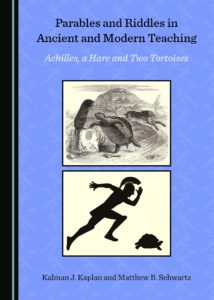 Parables and Riddles in Ancient and Modern Teaching
Parables and Riddles in Ancient and Modern Teaching